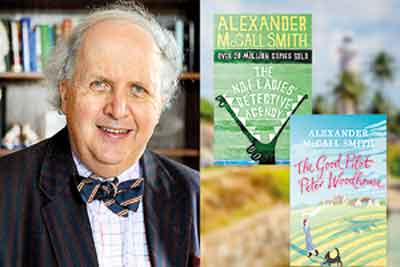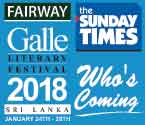Alexander McCall Smith could not bid adieu to Precious
 Alexander McCall Smith conceived his most famous character while watching a woman chase a chicken.
Alexander McCall Smith conceived his most famous character while watching a woman chase a chicken.
He would tell journalists that his wonderfully eccentric detective, Precious Ramotswe took shape when he was staying with friends in a small town called Mochudi. “A woman in the town wished to give my friends a chicken to celebrate Botswana National Day. I watched as this woman—traditionally built, like Mma Ramotswe—chased the chicken round the yard and eventually caught it. She made a clucking noise as she ran. The chicken looked miserable. She looked very cheerful,” he said, adding “At that moment I thought that I might write a book about a cheerful woman of traditional build.”
The book he eventually published was his first mystery novel. Through ‘The No. 1 Ladies’ Detective Agency,’ readers fell in love with Mma Precious Ramotswe, who was always ready to take on an interesting case. Over a series of books, she deployed her razor-sharp intuition and understanding of human character to variously, find a missing child, check up on the suitors of a wealthy lady, investigate unexplained deaths in a hospital, and solve the mystery behind the disappearance of an American in the desert.
Along the way, McCall Smith introduced his readers to everything he himself loved about Botswana, from the beauties of the African landscape to the dignity and courage he saw in its people.
A professor of medical law at Edinburgh University, he was born in what is now known as Zimbabwe and taught law at the University of Botswana. Along the way, McCall Smith authored over 50 books. Not all of them were mysteries. Here is an author with diverse interests and an extraordinarily robust intellect—he has to his credit specialist titles such as Forensic Aspects of Sleep and The Criminal Law of Botswana, children’s books such as The Perfect Hamburger, and a collection of stories called Portuguese Irregular Verbs. But it was with Precious Ramotswe that he really won people’s hearts.
The detective’s self-described goal is to “help people with problems in their lives.” Unwittingly, McCall Smith found he was doing the same with his readers. He received letters describing how people had read sections of his books aloud at wedding ceremonies and had drawn comfort from them while undergoing chemotherapy. In one case, a woman contemplating suicide told him that discovering his book had changed her mind about taking her own life.
 Subsequently, he would return to Mma Ramotswe’s world many times—her 17th adventure was published in 2017. “What happened is that I became so fond of the character that I could not let her go. To leave her where she was at the end of the first novel would have been rather like getting up and leaving the room in the middle of a conversation—rather rude.”
Subsequently, he would return to Mma Ramotswe’s world many times—her 17th adventure was published in 2017. “What happened is that I became so fond of the character that I could not let her go. To leave her where she was at the end of the first novel would have been rather like getting up and leaving the room in the middle of a conversation—rather rude.”
In The House of Unexpected Sisters, Mma Ramotswe must confront that she does not know everything about the father she idolised.
Reflecting on his practice and the inspirational nature of the work he writes, McCall Smith has said: “What I try to convey in some of my books is the sense of awe or mystery that can be experienced when we allow ourselves to be entranced by place, moved by friendship or love, or simply struck by beauty in art or in the world.”
| FGLF 2018 curator Jill Macdonald has this to say | |
 Jill Macdonald “Watching the Indian Ocean from Galle it’s easy to feel a 2,000 year-old silk route tying East to West underfoot. Now the Fairway Galle Literary Festival ties them again – and its silk is rich ideas.” DBC Pierre The Fairway Galle Literary Festival is above all a space for the open expression of ideas, convictions, passions and pastimes. In an age in which conformity exerts such a powerful sway, we have invited writers and artistes whose works celebrate the astonishing power of the human spirit to persevere and be true to itself – the resilience of individuals whose lives bear testimony to the distinctive creative potential of humanity. In an interview in the run-up to the announcement of this year’s Man Booker Prize, Baroness Lola Young had this to say about the six shortlisted works; “If there is an element in common across all the six shortlisted books, it is the questioning of our preconceptions – about love, death, time, identity, hope and expectations,” It is fair to say that similarly, if there is an element in common in the works that will be under scrutiny at this year’s Fairway Galle Literary Festival, it is this same questioning of our preconceptions. Questioning of preconceptions has always been a vital part of public discourse; at a time in which all over the world, political correctness has established such a stranglehold on freedom of thinking – let alone speech – this kind of questioning has become more rare and therefore, like all rare things, more valuable. At the Fairway Galle Literary Festival we will dare, like Carroll’s immortal Alice, to question and to debate but also to listen, so that we may mitigate the all too human urge to judge. After all, as George Saunders remarked on accepting this year’s Man Booker Prize, perhaps the best way to respond to the curiouser and curiouser times in which we live is to “take that ancient great leap of faith and do our best to respond with love . . . And with faith in the idea that what seems other is actually not other at all, but just us on a different day.” Truth is often stranger than fiction and many of the writers we have invited have been drawn to write by events that seem at odds with the shape of human history – and even more often, by events or by people who may not have seemed particularly significant at the time in which they took place or lived – but whose significance has changed or become more pronounced with time. And of course as George Eliot memorably remarked in her masterpiece Middlemarch, ‘the growing good of the world is partly dependent on unhistoric acts, and that things are not so bad for you and me as they might have been, is half owing to the number who lived faithfully a hidden life, and rest in unvisited tombs”. The Fairway Galle Literary Festival offers us a chance to visit those tombs. This is made possible by the works of historian Shrabani Basu, not only her Victoria and Abdul – now a major motion picture with Judi Dench in the eponymous role, in which she uncovers for us, a story lost for over one hundred years – but also her thoughtful exploration of the role of Indian troops in the two world wars, For Another Country. Man Booker Prize Winner (2014) Richard Flanagan will share with us the experience of his father in a prisoner of war camp in The Narrow Road to The Deep Blue North, while Bachi Karkaria will speak about her account of the Nanavati murder case that was to signal the end of the jury system in India – the first non-fiction account of a case that has given rise to numerous fictional representations. The Lord Puttnam, whose “Chariots of Fire” immortalized not only the determination of two young men to be true to their own ideals but also a style of Olympics now almost entirely a thing of the past , will – in a talk on his passion for climate control – enjoin us to try to arrest a similar eroding of the glories of the natural world. On a lighter note, Alexander McCall Smith will share with us his stories of ordinary people in extraordinary circumstances, while Chhimi Tenduf-La will bring works of fiction which, with their masterful demonstration of the serious potential of comedy – indeed in his hands it is evident that comedy is really the only way one can be serious enough – will once more remind us of the contradictions at the heart of the human experience. |


